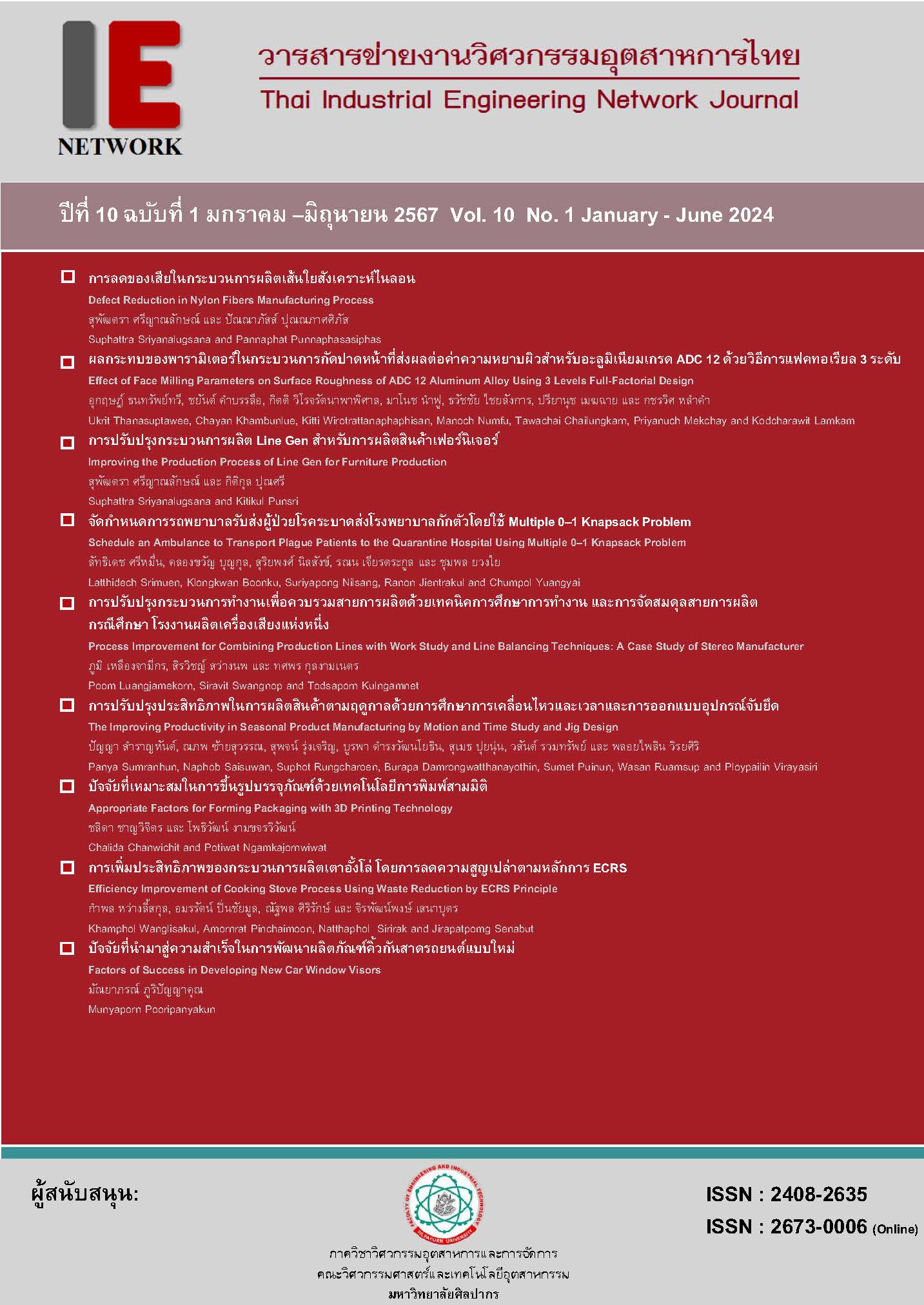Efficiency Improvement of Cooking Stove Process Using Waste Reduction by ECRS Principle
Main Article Content
Abstract
This research studies and improves the efficiency of the cooking stove production process to reduce waste. A study of the production workflow reveals that the honeycomb-making step involves non-value-added activities, resulting in delays due to waiting, transportation, and over motion, respectively. For these issues, The ECRS principle select to eliminate non-necessary; design and manufacture for the steps. The honeycomb punching mold is the assistance device by design and construction engineering. In this step combines a compress plate molding and punching steps. After the improvements, the honeycomb-making activities reduces from 14 to 11 and the work time decreases from 6,100.75 minutes per piece to 4,657.35 minutes per piece (23.66% of work efficiency). Additionally, the cycle time of the cooking stove production process reduces from 6,102.45 minutes per unit to 4,662.45 minutes per unit.
Article Details

This work is licensed under a Creative Commons Attribution-NonCommercial-NoDerivatives 4.0 International License.
บทความ ข้อมูล เนื้อหา รูปภาพ ฯลฯ ที่ได้รับการตีพิมพ์ในวารสารฯ ถือเป็นลิขสิทธิ์ของวารสารฯ หากบุคคลหรือหน่วยงานใดต้องการนำทั้งหมดหรือส่วนหนึ่งส่วนใดไปเผยแพร่ต่อหรือเพื่อกระทำการใดๆ จะได้รับอนุญาต แต่ห้ามนำไปใช้เพื่่อประโยชน์ทางธุรกิจ และห้ามดัดแปลง
References
K.A. Harish and M. Selvam, Lean Wastes: A study of classification from different categories and industry perspectives, The Asian Review of Civil Engineering, 2015, Vol. 4 No.2, 7-12.
A. Jaffar, S. Kasolang, Z.A. Ghaffar and N.S. Mohamad, Management of seven wastes: A case study in an automotive vendor, Journal Technology (Sciences & Engineering), 76:6, 2015, 19–23.
O. Chuamaungphan, W. Wanlo, S. Dongta and N. Chaicook, Analysis of the effect of seven wastes in lean process on operational efficiency of OTOP products in mae lao district chiang rai, Journal of Legal Entity Management and Local Innovation Vol. 7 No. 4, 2021, 157-170. (in Thai)
N. Sriputtha, J. Kositwat and D. Kaewdook, Reducing waste in detergent packaging process by using ECRS technique, The 5th Rajamangala Manufacturing and Management Technology Conference, Proceeding, 2020, 190-196. (in Thai)
B. Suhardi, N. Anisa and P. Widyo Laksono, Minimizing waste using lean manufacturing and ECRS principle in Indonesian furniture industry, Cogent Engineering, 2019, 1-13.
A. Pertiwi and R. Astuti, Increased line efficiency by improved work methods with the ECRS concept in a washing machine production: a case study, Journal System and Management Industry Vol. 4 No 1, 2020, 13-29.
S. Limsuwan, Efficiency Improvement of the Super Cooking Stove Process, Journal of Ubon Ratchathani University, 2010, 17-28. (in Thai)
P.Boonwang, An application lean concept for waste reduction in production case study of ABC company, Major of Transport and Logistic management, Burapha University, 2013, (in Thai)
C. Kasemset, C. Boonmee, and P. Khuntaporn, Application of MFCA and ECRS in waste reduction: A case study of electronic parts factory, Thai International Conference on Industrial Engineering and Operations Management, Proceeding, 2016, 1844–1853.


